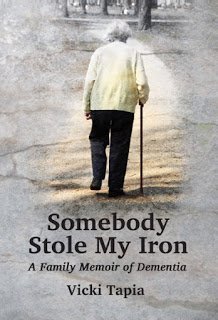“Alzheimer’s is not about the past—the successes, the accolades, the accomplishments…Alzheimer’s is about the present and the struggle, the scrappy brawl, the fight to live with a disease. It’s being in the present, the relationships, the experiences, which is the core of life, the courage to live in the soul.” —Greg O’Brian, 2014
There are many kinds of dementia. Most cause similar symptoms to Alzheimer's disease. My father, a retired physician, had vascular dementia. Before he died in May of 2017, he required care, especially at night when he sometimes became angry and disoriented. He told me once, in an out-of-control rant, that he wanted to split open my head—my father, who signed every note and letter he ever wrote to me with the acronym SWAK (sealed with a kiss). The changes in his abilities and personality were heartbreaking, but he could be more himself at times. I know what it is to witness a loved one lose the ability to make sense of relationships—lose the ability to make sense of the world, no matter what kind of dementia they suffer.
Alzheimer's disease results in the complete loss of cognitive function, and it is, at present, incurable. A few drugs are available to slow memory loss before the disease is too advanced, but they don't work for everyone, and they don't bring about lasting relief for anyone. One of the more hopeful approaches to the treatment of Alzheimer's is the possibility of slowing its progression by making changes in lifestyle related mainly to diet, exercise and sleep.
Compared to many afflictions, Alzheimer's is relatively slow moving. Symptoms usually become noticeable after age 65, but the disease begins decades earlier (the preclinical stage) with imperceptible cellular changes in the brain. There is much we do know about it. For information, visit the Alzheimer's Association website and look through the resources on this page.
In the early stage of Alzheimer's, which can last more than five years, a friend is coping with memory lapses and problems with language, directions, initiative and judgement, among other symptoms that vary from person to person. As the disease worsens, the round-the-clock caregiving becomes necessary. The role of caregiver is most often filled by family members, who must deal not only with overwhelming new responsibilities but with the steady decline of a loved one unable to communicate effectively or to perform even simple acts of daily living, such as washing and dressing. Challenging behaviors can emerge with little warning; many of these are quite difficult to manage.
Eventually, a person with Alzheimer's will fail to recognize family and friends—even his or her own reflection in a mirror. Dementia, whatever the type, is isolating. It disrupts relationships and social connections for both the patient and the caregiver.
To navigate to the Alzheimer’s and Dementia blog, click here and select the topic. You’ll find stories and advice from people who are living with dementia.
More Information
Websites
The Alzheimer’s Association—The best resource I know for support and information—support groups, social events, fundraising, community resources, a national library of materials; Look up the chapter nearest you.
Alzheimer’s Disease, by Kristin Compton
Alzheimers.net—Information, support, inspirational quotes
Alzheimer’s Reading Room—Well-subscribed blog for caregivers
Alzheimer's Society: United Against Dementia
The Alzheimer’s Store—Unique products to help patients with AD, many products for middle and late stages
AssistedLiving.org —List by state of assisted living facilities (not inclusive) and articles with questions to ask prospective facilities. Based on my experience, I would add this question, too: Has there ever been a lawsuit or formal complaint filed about your facility?
Blondes vs Brunettes: blondesvsbrunettes.org—Group formed to raise awareness of AD among young people; hosts an annual powderpuff football game fundraiser which has contributed over $1M nationally to Alzheimer’s Association chapters; not as much a resource of information as an innovative way to support the Alzheimer’s Association in selected cities; see also the Blondes vs Brunettes Facebook page.
Early-onset Alzheimer’s: When Symptoms Begin Before Age 65
Mayo Clinic—Information about Alzheimer’s disease; podcasts, interviews, articles, discussions
seniorguidance.org—Many articles and listings of assisted living facilities
The Ultimate Resource Guide for Seniors and Their Families, by Daniel Gleich
Blogs
Karen Garner—Karen’s husband, Jim, was diagnosed with early-onset AD. Karen writes honestly and compellingly about her journey as a caregiver with children still living at home
Kris Bakowski—Kris was diagnosed in her mid-forties with early-onset AD. She journals her daily life, posting many photographs of her family and friends. Her blog is an honest look at the difficulty of coping with dementia
Maria Shriver—An uplifting website (and can’t we all use an uplift?) with useful information and resources on caregiving and Alzheimer’s, as well as life in general
Caregiving
Communicating with Alzheimer’s
Alzheimer’s (help with various issues): www.helpguide.org
The Benefits of Cooking with Alzheimer’s: A Caregiver’s Guide
Caregiver Burnout: How to Recognize, Regroup, & Recoup from Caregiver Stress
Caregiver Tips for Traveling with the Elderly
Caregiver Stress: Remembering to Take Care of Yourself
Connecting With Alzheimer's Patients -- Even in the Latest Stages of the Disease
Dementia and Hygiene: How to Solve Hygiene Problems Common to People with Dementia
Dental Care Tips for Caregivers
Everything to Know for Family Caregivers
How to Care for Your Aging Parents from a Distance
A Caregiver’s Guide to Medicare
Substance Abuse and Caregiving
Summer Skin Care Tips for Seniors
National Alliance for Caregiving—Comprehensive information for and about caregivers. Hosts Lotsa Helping Hands, a resource to help friends organize
The New Breed of Service Dog: Canine Caregivers for Alzheimer's and Dementia Patients
101 Activities | Alzheimer’s Association
Visual Education Center for Family Caregivers—Short, well-produced videos that portray the experience of AD through interviews of patients and caregivers. Informative and practical
The Ultimate Guide to Rehab and Medicare
Children, Grandparents & Other Relatives and Friends
Helping Kids Cope When A Family Member Has Dementia
Helping Your Children Adjust to an Elderly Grandparent Moving In
What’s Happening to Grandpa? Maria Shriver (2004) Little, Brown Books for Young Readers.
Emotional Support
Activities for Alzheimer's and Dementia Patients
The Benefits of Emotional Support Animals
https://cbdoilsandedibles.com I spent some time reviewing this website. While not mainstream, the information is compelling and might provide another approach, worth discussing with your physician, to some of the problems of dementia. In my experience, relief can be found sometimes by thinking and looking outside the box.
Connecting With Alzheimer's Patients -- Even in the Latest Stages of the Disease
Depression Is Not a Part of Growing Older
Depression in Older Adults and the Elderly
Drug Abuse Treatment and Recovery
Getting a Pet Can Improve Aging in Place
14 Ways to Help Seniors Avoid Isolation
Guide to Addiction Prevention for Seniors
Healthy Aging: Preventing Isolation
Healthy Living for Seniors Includes Friendship
Helping Alzheimer’s Sufferers Cope with the Loss of a Loved One — A Guide for Caregivers
How to Make a Loved One's Final Days at Home Comfortable
How Seniors are Designing Social Support Networks
Alzheimer’s and Keeping Active/Involved
Senior Loneliness: The Risks of Loneliness and Senior Neglect
Recognizing and Treating Depression: A Guide for the Elderly & Their Caregivers
Three Unique Ways Seniors Can Conquer Anxiety
6 Signs of Elder Abuse in Seniors with Dementia
6 Powerful Ways to Help Seniors Avoid Isolation
Understanding How Alzheimer’s Disease Changes People--Challenges and Coping Strategies
Why Substance Abuse Among Seniors Can Be Devastating
Finances
Alzheimer’s & Dementia Legal Planning & Financial Resources
Alzheimer’s, Dementia and Money Management
A Caregiver’s Guide: Finance Protection for Those with Alzheimer’s
Common Online Scams Targeting Seniors
Economic Security for Seniors Facts
Financial Education for Older Adults
Senior Care Costs: How to Cover Life Transitions
6 Steps to Take When a Credit Card Holder Dies This article may be useful, too, when a credit card holder has dementia and can no longer be financially responsible. Telephone numbers are provided and instructions about how to freeze credit reports, which is definitely a good idea.
The Simple Dollar: Taking Over Your Aging Parents' Finances
The Stress-Free Guide to Selling an Inherited Home
Health & Exercise
Alcohol Consumption in Seniors: A Delicate Balance
16 Chair Exercises for Seniors and How to Get Started
Mattressreviews.net Website with helpful reviews if you're looking for a new mattress because you want to sleep better. The choices can be confusing.
8 Practical Tips to Help someone with Dementia to Eat More
A Guide to Senior Health and Safety
Sleep Help for Seniors, Alzheimers and Sleep Blog Post
Rehab and Medicare: The Ultimate Guide to Addiction Treatment for Seniors
RehabNet.com—National Council on Seniors Drug & Alcohol Rehab
Too Old To Quit? Smoking and Seniors
Housing & Safety
Aging at Home: Common Problems and Solutions
Aging in Place Design & Technology Tips | HomeAdvisor
Aging in Place with a Little Help from Roommates, Neighbors and Teenagers
Alzheimer's or Other Dementia: Should I Moved My Loved One Into Long-Term Care?
Alzheimer's: Smoothing the Transition on Moving Day
Budget-Friendly Smart Home Accommodations for Seniors and Individuals with Special Needs
Building the Ultimate Reading Nook for Your Home This link was sent to me by Jim Vogel. Many people with dementia can no longer read, but my mother, like Jim's enjoys it, even though she suffers from short term memory loss. Creating a comfortable, quiet sitting environment in your home can be helpful for a person with dementia, even if it isn't used for a reading nook.
Emergency Preparedness Guide for the Elderly
Fall Prevention Tips for Seniors | A Home Design Guide
5 Fall Prevention Ideas for Bathroom Showers
A Guide to Downsizing for Seniors and Their Loved Ones
A Guide to Helping Senior Citizens Stay at Home
Getting a Pet Can Improve Aging in Place
Home Insulation Guide for the Elderly I usually don’t post information from commercial websites, but this guide is quite helpful, particularly for UK readers, with links to such topics as how to stay warm and healthy in winter. I found out about an option I hadn’t thought of for my own house from it.
26 Home Security Tips for Seniors
How to Easily Transition to Assisted Living
Limited Mobility Home Modification Checklists and Funding
Modifying Outdoor Spaces for Senior Safety
Making Your Home Dementia Friendly
NursingHomeAbuseCenter.com NursingHomeAbuse.org
Preparing Your Home for a Loved One with Alzheimer’s: A Caregiver’s Guide
Room-by-Room Home Safety for People with Alzheimer's Disease
A Senior's Guide to Moving in with a Roommate
Senior Friendly Guide to Medical Alert Systems
Should You Own or Rent a Home in Retirement?
6 Signs of Elder Abuse in Seniors with Dementia
The Ultimate Guide to Home Accommodations for Persons with Disabilities
What is Environmental Illness? Cleaner Indoor Air I realize this link is not directly about seniors or dementia, but my 91-year-old mother lived with me until her death and suffered from asthma, so I feel it's relevant for everyone's health to consider the inadvertent effects our living environment may have on health.
Long-Distance Caregiving
Long-Distance Caregiving: How to Ensure Your Loved Ones are Safe at Home
Technology
Assistive Technology - Devices to Help with Everyday Living
A Senior Citizen’s Guide to Privacy Online
How Technology Benefits Senior Citizens
Nine Essential Mobile Apps for Senior Citizens
A Senior’s Guide to Using Computers and Software
How Technology Benefits Senior Citizens While not specifically about dementia or caregiving, this article has good information that will help in the early stages, especially.
Smart Home Technology for Seniors Again, while not specifically about dementia, contains information on products that allow for such things as monitoring of household appliances, help locating frequently misplaced items and security. These devices might make independent living possible for a longer period of time in the early stages of dementia.







With this journey I have a beginning, I know what the “body” will be and I know better than most how it will end. The facts: I have mild cognitive impairment (MCI), the precursor to Alzheimer’s, (AD), but I want this blog to help others with this disease and to help everyone understand what is going on in my head—a person in the early stages—for as long as possible.